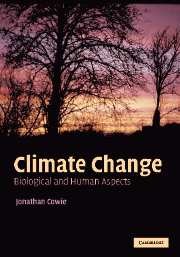Book contents
- Frontmatter
- Contents
- Introduction
- Acknowledgements
- 1 An introduction to climate change
- 2 Principal indicators of past climates
- 3 Past climate change
- 4 The Oligocene to the Quaternary: climate and biology
- 5 Present climate and biological change
- 6 Current warming and likely future impacts
- 7 The human ecology of climate change
- 8 Sustainability and policy
- Appendix 1 Glossary and abbreviations
- Appendix 2 Bio-geological chronology
- Appendix 3 Calculations of energy demand/supply and orders of magnitude
- Appendix 4 The IPCC 2007 report
- Index
- References
8 - Sustainability and policy
Published online by Cambridge University Press: 17 December 2010
- Frontmatter
- Contents
- Introduction
- Acknowledgements
- 1 An introduction to climate change
- 2 Principal indicators of past climates
- 3 Past climate change
- 4 The Oligocene to the Quaternary: climate and biology
- 5 Present climate and biological change
- 6 Current warming and likely future impacts
- 7 The human ecology of climate change
- 8 Sustainability and policy
- Appendix 1 Glossary and abbreviations
- Appendix 2 Bio-geological chronology
- Appendix 3 Calculations of energy demand/supply and orders of magnitude
- Appendix 4 The IPCC 2007 report
- Index
- References
Summary
Having an understanding of climate change is one thing, relating this to real-world development is another. In the latter half of the twentieth century it became apparent to politicians that human impacts on the environment were sufficiently detrimental that they undermined the sustainability of human well-being and relatedly environmental quality. Human well-being is a catch-all term relating to material and cultural standards as well as quality of life.
Many of these terms, while having a clear meaning to western politicians and policy-makers, have no strict definition or individual basis of quantitative indexing in the strict scientific sense, although in some instances attempts have been made. Sustainability itself, as we shall see, does have a specific definition that is enshrined in international agreements and sustainability is affected by climate change. Consequently the history of what politicians mean by sustainability, and how current climate-change issues affect it, are central to developing climate change and human ecology from topics of academic interest to those of application.
Key developments of sustainability policy
UN Conference on the Human Environment (1972)
The 1972 Stockholm Conference on the Human Environment was the first of a series of UN conferences that arguably developed international environmental policy significantly. It was attended by 113 nations, but due to a dispute on the status of East Germany the USSR and all the Eastern European nations (many of which now are considered Central European), bar Romania, refused to participate.
- Type
- Chapter
- Information
- Climate ChangeBiological and Human Aspects, pp. 392 - 468Publisher: Cambridge University PressPrint publication year: 2007



